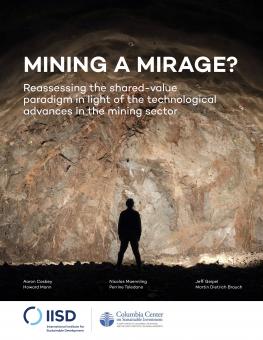
Mining a Mirage? Reassessing the shared-value paradigm in light of the technological advances in the mining sector
This report uses real-world mining data to estimate the impacts of new technologies on employment and employment-related procurement, which drive major benefits in host countries.
Technologies currently being deployed will mean that the mines of the future look much different than today’s operations.
Among the major changes will be fewer employees, thanks to labour-saving innovations. Yet local employment and employment-related procurement are major drivers of host country benefits, and an important part of the shared-value proposition.
This report, co-produced with the Columbia Center for Sustainable Investment, looks to the near and medium terms, exploring what will happen to the local employment and procurement components of the shared-value paradigm—and, by extension, to the mining companies’ social licence to operate—if technological change radically alters the amount of money mining firms are spending on hiring and procurement. It surveys the trends in technology development, and uses procurement and other data from two global mining firms to estimate the types of impacts we might see. It concludes by exploring the ways in which governments and firms might address the predicted results.
Participating experts
You might also be interested in
Ecuador Referendum Rules Out ISDS Return, Underlining Public Support for a Sustainable Path
Ecuador has voted to allow international arbitration and investor–state dispute settlement (ISDS) in its treaties and agreements. But the risks that initially made them turn away from this outdated model remain.
CSDDD: EU's Due Diligence Law Vote Should Drive Supply Chain Sustainability Efforts
The European Parliament has voted to adopt the Corporate Sustainability Due Diligence Directive, aiming to address the environmental and social impacts of the supply chains of Europe's large corporations.
IISD: EU’s Historic Energy Charter Treaty Vote Will Boost Energy Transition
The European Parliament has voted for the European Union to withdraw from the climate-threatening Energy Charter Treaty.
Strategic Environmental Assessment for the Mining Sector
Strategic environmental assessments (SEA) are an essential tool for policy-makers working to develop a sector-wide vision for responsible mining.